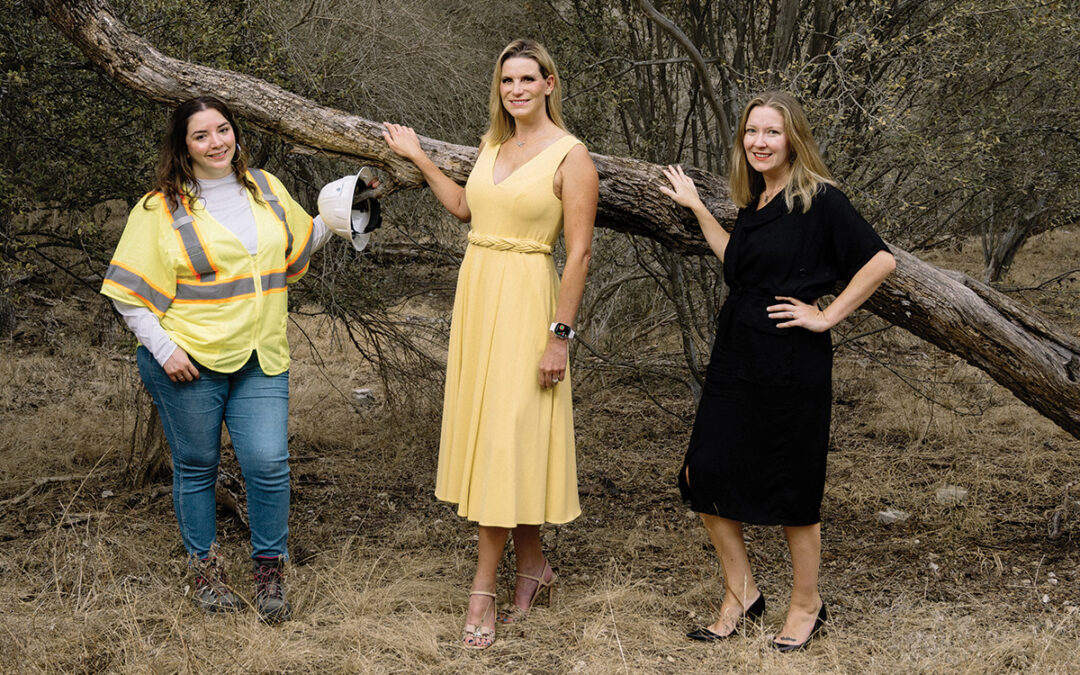What is civility? A courteous nod to a familiar face; an “excuse me” when passing by someone in a narrow corridor; using please and thank you to show appreciation for another’s actions? In olden days, the word civil brought to mind a cold but correct conversation between two feuding families on the steps of the local parish. Today, you might consider civil as the way you treat an elderly neighbor, the pediatrician or your child’s teacher. In its simplest form, civility is being respectful, courteous and polite to one another. It’s about getting along with other people.
In today’s society, with so much communication occurring via cell phones and computers — we Tweet, we text, we blog, we Facebook — simple civility may seem obsolete. Why write a thank you note when a text is so much quicker? But according to some knowledgeable San Antonio women, the significance of civility at home, at school and in the workplace continues to be of utmost importance and a mandatory interpersonal skill for all areas of life.
Civility every day
Diane Gottsman, nationally recognized etiquette expert and owner of The Protocol School of Texas, a company specializing in corporate etiquette training, knows this better than anyone. Gottsman describes it this way: “Civility is more than simply using ‘please’ and ‘thank you.’ It is about building relationships, thinking of others, not just yourself, and recognizing how your behavior affects others.” You might think that someone who makes her living training others in interpersonal skills would be opposed to the plethora of technology that seems to have stripped politeness and thoughtfulness right out of the face-to-face encounter, but that is not the case. In fact, Gottsman embraces it. “Technology has certainly impacted us,” she agrees. “And we have evolved. It facilitates us. But we don’t build a relationship with our iPhone. We are not making an emotional, physical relationship with our social media. However, it is very important in today’s society, and we still have to do it in the proper manner.” Civility, it seems, transcends even the cell phone. According to Gottsman, “We all need to exercise boundaries with our gadgets. They serve a purpose, but they are not substitutes for human interaction. Even when we are talking to someone via a telephone, we are still sending a message through our tone.” And, she cautions, the same measure of civility must be maintained when texting or e-mailing. “We must be careful because there are no facial expressions or voice inflections to go along with the message.”
It is commonplace today to see a person on a cell phone in almost any situation — the grocery store, the dry cleaners, in church, at the checkout counter of any department store — chatting away as though they are sitting alone in their own living room. This brings to mind a saying that every mother has used with an errant child: “Just because everyone else is doing it doesn’t make it right.” Common sense and simple courtesy must be used when determining an appropriate time and place for a cell phone conversation. “Cell phone conversations can be a real nuisance,” Gottsman agrees. “Civility is not just reserved for the classroom, a boardroom or when you are in the presence of someone you would like to impress. It is everyday good manners, the way you act in front of those you may never see again, that will leave a lasting impression and provide a good indicator of who you are as a person.”
Here are Gottsman’s guidelines for using a cell phone:
•Don’t assume the person on the other end knows who you are — identify yourself immediately.
•Ask the other person if he or she is available to talk. Don’t just start into a conversation.
•Stay off your cell phone during a meal with a business associate, friend or family member. Talking to someone else is rude!
•Do not discuss sensitive information on a cell phone.
•Don’t yell into the cell phone — the microphone is highly sensitive.
•If you must take your cell phone into a meeting, turn it on vibrate and alert the leader that you may have to temporarily excuse yourself.
Still, as much as she admits technology is here to stay, Gottsman maintains the importance of good interpersonal skills. “Companies don’t hire a cell phone,” she explains. “They hire a person. A personality. In my business, rarely do companies hire me to train technology etiquette, although I do touch on it. They want corporate leadership skills, which are interpersonal skills, which are professional and social interrelation skills.” In a word? Civility. As far as kids go, Gottsman has her own teen at home to keep her apprised of the newest technology and its popularity. “One of the greatest forms of communication between teens is texting,” she admits. “That’s not a bad thing … within reason.” The technology boom has affected every age, especially teenagers. Gottsman admits that raising children in the technology era is new territory. Twenty years ago, parents taught their children proper phone etiquette from the phone that hung on the kitchen wall. Although the phone now resides in a pocket, the same principle applies. Children must be taught appropriate and inappropriate use of technology and the importance of maintaining civility in all forms of communication.
Gottsman is quick to point out that these guidelines apply to adults as well as kids. “Can you build a relationship via texts?” she asks. “No. Can you ask someone out over a text? No. And you never, ever break up with someone over a text or on Facebook,” she states. “But once you have established a relationship, you can certainly make arrangements via text or e-mail. But texting or communicating via Facebook should never take the place of face-to-face communication.” And no matter how proficient a person is with phone etiquette, it’s still about the person that walks through the door. This is especially true in today’s work force. According to research conducted by Harvard University, Carnegie Foundation and Stanford Research Institute, 85 percent of job success is based on personal conduct and a person’s ability to put others at ease. Only 15 percent of job success is based on technical knowledge. According to Gottsman, persons must have the necessary people skills if they want to make the right impression: “When you go for that job interview, there must be something that sets you apart from the competition. You may get the job, but you won’t keep the job if you don’t know how to treat another human being with dignity and respect.”
Civility at work
Tina James, senior vice president of human resources for H-E-B, considers civility in the workplace to be the real barometer of a company’s values. “How people treat each other, how they treat their customers and how they expect others to behave are reflections of the company’s standards,” she explains. “Partners who work in a pleasant, friendly atmosphere where people care about each other are happier, more engaged and more likely to take good care of their customers. I always tell my kids, how you behave is who you are, and really, it’s no different for a company.” James was quick to confirm the Harvard findings, reiterating that interpersonal skills are even more important today than they were in the past and far surpass a person’s need for technical knowledge to be successful in the workplace. “It takes stronger interpersonal skills to overcome the impersonal nature of technology,” she explains. And she credits today’s advanced technology with helping to produce a more versatile employee. “I actually think new employees have stronger social skills because they are more comfortable interacting with large numbers of people whom they may not know well. Technology has made that type of interaction much more prevalent and accessible.”
But she cautions, “With technology ever evolving, we as a society are in danger of becoming impersonal and desensitized. We have to remember that technology is meant to enhance our connectivity and foster our ability to communicate, not replace it.” Although H-E-B has benefited from many of the technological advances over the past decade, James reiterates that the majority of business at H-E-B is still conducted the old-fashioned way: partner to customer. “We have 75,000 partners taking care of more than 8 million customers every week. We are in the business of customer service. No matter how much technology we have, we wouldn’t last very long if we didn’t know how to treat people with the dignity and respect they deserve,” she says.
It is easy to see as you walk through any department or down any aisle that H-E-B strives to maintain a friendly, caring atmosphere where civility is the norm, not the exception. According to James, this doesn’t happen by accident; it’s the company culture, carefully developed and nurtured from department managers on down. She explains, “When we asked partners why they work at H-E-B, they said, ‘because at H-E-B, people matter.’ This feeling is the foundation of our entire company. Every person at H-E-B knows that no matter where they work, no matter whom they’re interacting with, they are expected to reflect the company’s culture — that people matter.” At H-E-B, James says, employees are offered strenuous training programs such as The Spirit of H-E-B, It’s About Respect, conflict management and emotional intelligence to reinforce expectations around their culture and civility. “While we do offer anti-sexual-harassment courses, and in the rare cases it’s needed, anger management, it’s more the everyday environment that reinforces our expectations. Frankly, because we work so closely with our customers and communities, we have zero tolerance for partners with harassing behavior or anger management issues,” she says.
James works hard to ensure that all new employees continue to mirror these high standards of civility. “I think we’re fortunate in that friendly people are attracted to our business — they want to shop here and work here because it’s a positive environment,” she says. “One thing I do with candidates who are interviewing for high-level positions is walk a store with them. I watch for how they treat the people they’re not interviewing with — the checker, the customer, the receptionist, the partners we pass in the hallway. It’s a huge red flag for me if they don’t acknowledge those folks. They’re not a good culture fit if they don’t know that each and every person matters at H-E-B.” According to James, these high standards of civility are expected of all partners in all areas of communication, including their use of cell phones and social media. She says, “While we do have workplace guidelines around discourteous or unprofessional behavior as well as the use of technology and social media, the fact of the matter is, in a company as large as H-E-B, we can’t be everywhere all the time, enforcing every rule. So what ends up being much more effective than rules and guidelines is our company culture.”
And partners are expected to maintain these high levels of civility in their everyday lives as well as the workplace. “We don’t routinely monitor our partners’ use of H-E-B technology,” James admits. “But we do monitor social media and other H-E-B-related sites to ensure our partners are behaving the same way in that forum as we would expect in the workplace.” She also says that it is the employees’ fellow partners who, in the end, are the best monitoring system H-E-B has for courteous, civil behavior: “Our partners are quick to let us know when someone is not behaving appropriately.”
Civility at school
In the hallways of Clark High School, vice principal Melissa Grijalva uses humor to head off an “uncivil” situation as one student pushes through the crowd on the wrong side of the hallway. “Now, is that the right way to get there?” she asks, steering the errant student back into the flow of traffic. “I try to use humor a lot of the time with the kids to show them better ways to handle situations.” If there is one demographic and one locale where most would expect to see uncivil behavior, it is teenagers in a crowded high school hallway. There is just something about the word teenager that conjures images of mismatched clothes and wild piercings, kids shouting obscenities at a teacher or texting on their cell phones with complete disregard for the world around them. But Grijalva denies this. “I think a lot of times, people who don’t work with teenagers and aren’t exposed to teenagers see them as derelict or bad. But we deal with those kinds of students a lot less than you might think. I really don’t see that civility in the schools has changed that much since I was in high school,” she says.
According to Grijalva, civility begins at home with the parents and greatly depends on how a child is being raised. Certainly, children’s upbringing differs greatly from student to student. When manners and civility are enforced at home, then most often the students bring those qualities with them to school. “Some parents don’t necessarily demand that their child look them in the eye, or say ‘yes ma’am’ and ‘no ma’am,’” she explains. “Sometimes you are starting at the bottom in an effort to increase their civility, to help them understand how it makes others feel when they are polite or treat others with kindness. I think that has always been the case. But kids who do not treat others with respect are the exceptions, not the rule.” Promoting civility in the school environment requires a collective effort between administration, teachers and students, says Grijalva. However, just as parenting styles differ, teachers also have varied expectations. “Teachers play a big role in promoting civility between students and within the classroom,” she says. “For some teachers, following school rules is hugely important, and you are being disrespectful if you don’t follow the rules. For example, one teacher may address a student for not following the dress code. Another teacher may say nothing about a dress code infraction. It really depends on the teacher. One teacher may require students to address them with ‘yes ma’am’ and ‘no ma’am. Another may not. It really depends on what rules and expectations the teacher finds merit in.”
But there is one area of civility that all Clark faculty members agree on, and that is the campus’s zero tolerance for bullying. “Our teachers are cognizant of it and definitely report it when it comes along,” Grijalva states. “Sometimes you just have to bring it to a kid’s attention. It’s almost like they are young children, and you have to remind them what is polite, what is kind. We talk a lot about respect and manners and being polite even when you don’t agree with someone, and the proper ways to express your frustration in a situation. We spend a lot of time projecting those values and morals on kids without crossing the line.” Although there are no specific classes or programs addressing civility offered to students, Grijalva notes that many of the extracurricular programs have their own set of standards that kids must follow in order to participate. One example is the football program. “An integral part of the football program is treating others with respect, and it is a huge issue if the players don’t show respect to other students,” she says. “Another example is the ROTC. They better not ever catch a student addressing an adult without saying ‘yes, sir’ or ‘yes, ma’am.’”
Grijalva believes this is really the key to maintaining civility within the school system: “At Clark, we find that students who are connected in some way other than academics to our campus are the students that will be the most successful.”
As far as monitoring a student’s civility when using a cell phone or social media, Grijalva says that she does get involved if an incident starts on campus or spills onto the campus in some way. “We usually address it by letting the parents know or letting the kid know that we know what is going on. It’s a slippery slope because we don’t want to invade their privacy per se, but if it is brought to our attention or stems from an incident that occurred on campus, then we will address it. Any threatening or bullying via texting that occurs on campus will be addressed,” she says emphatically. “We also have in loco parentis that governs school law that basically says in the absence of your parents, we act as your parents. And for the most part, parents are very supportive and want to be informed about their child’s antics and want to work with us.” Civility, it seems, continues to be an important life skill, and we as a society must continue to strive to promote it in all aspects of our lives. Gottsman sums it up in these words: “We learned ‘please’ and ‘thank you’ when we were 3 and 4 years old. But we don’t stop there. As we grow into adulthood, we continue to learn age-appropriate skills. As adults, our skills grow as we grow. Whether in the home or the workplace, you always have the ability to affect someone else’s life through your behavior.”









0 Comments